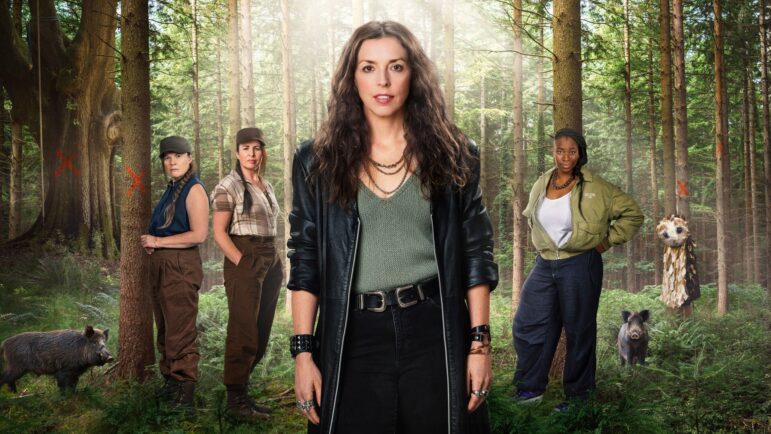 The Change, the new Channel 4 sitcom from comedian Bridget Christie, is proving a hit among Britain’s Pagans, with its combination of the allure of the forest, local folk customs, and menopause.
The Change, the new Channel 4 sitcom from comedian Bridget Christie, is proving a hit among Britain’s Pagans, with its combination of the allure of the forest, local folk customs, and menopause.

The cast of Channel 4’s “The Change” [Channel 4]
Retail worker Linda (Christie) doesn’t exactly have an unhappy life: her husband, Steve, is loving but clueless, and her teenage children think she swallows too loudly. But the final straw comes after her 50th birthday party (organised entirely by herself), when she opens a cupboard and is covered in a tsunami of old takeaway boxes. (This has happened to your author on at least one occasion, too.)
Linda’s been keeping track in a decades-long, handwritten ledger and decides that she wants to take back some of the 3 million minutes she’s spent on emotional labour. She heads over the Severn Bridge to the Forest of Dean on her old Triumph motorbike, to look for a time capsule she placed in a tree at the age of 10. She is initially aided in this, grudgingly, by a pair of women named the Eel Sisters (“Serving eels and mash to men since 1850!”)
While in the Forest, she is besieged by a slew of texts from her bewildered family (“Steve can’t find the cheese grater!”), which she largely ignores. She tells no-one about her immediate family, or about her domineering, bullying elder sister Siobhan, saying that women shouldn’t be defined by whether or not they’re wives and mothers. She does, however, send a copy of the work of Simone de Beauvoir, which she finds in a charity shop, back home to her husband, who immediately recognises the plight and drudgery of the housewife described in this seminal feminist text. Unfortunately, although he can instantly see that this applies to his own domestic situation now that his wife’s taking a trip, he is incapable of applying it to her. (Even worse, his friends’ wives start adopting the ledger idea.)
Linda, temporarily freed from her turgid domesticity, makes new friends: enigmatic DJ Joy, her anti-woke local radio counterpart The Verderer ( a man who is constantly complaining about ‘snowflakes’ but who is moved to tears on spotting a nightingale and who goes to live in a tree to stop road developers demolishing a swathe through the Forest), and Pigman, a former banker who now herds some of the Forest’s wild boar and who becomes a true friend to Linda.
There is an epic town meeting in which the issues of blackface Morris, road development, and the gender role reversal of the annual Eel Festival are dealt with in a superbly brisk economy of film-making (not to mention local Lothario Tony’s trouser reveal). And as someone points out in relation to the gender issue, eels do not have a gender until fully grown, a plot point which proves important later on. Linda’s menopausal journey ends – at least as far as this first series goes – with the Eel Festival itself, and on a cliffhanger.

Bridget Christie as Linda on her Triumph motorbike in “The Change” [Channel 4]
The Evening Standard, in its own review of The Change, said that viewers would “come for the menopause and stay for the Druids.” Although there are no actual Druids in this, the entire series is imbued with a Pagan, feminist sensibility, including what the Guardian also memorably referred to as “sheela-na-gig chic.”
It is a short series, six episodes of around 24 minutes each, but it covers an awful lot of ground: from domesticity to modern gender norms, class, racism, and exceptionalism in rural communities, spirituality, ecology and activism, and menopause itself, the hinge around which this story turns. A number of commentators have compared it to The Detectorists, and there are similarities, plus analogies to the most recent series of Worzel Gummidge. They’ve all got a faint (and perhaps not so faint) folk horror vibe, but they’re all funny and good hearted pieces of television. I also found it reminiscent of Twin Peaks: it has the same eldritch, forest-based sensibility and weirdness.
We also need to mention the outstanding folk soundtrack: songs from elder folk stateswoman Shirley Collins feature heavily, including “The Cherry Tree Carol” and “Adieu to Old England.” Now well into her 80s, she recorded a new version of “Hares on the Mountain” for The Change. The work of John Renbourn and others also appear.
I watched The Change with some interest: I am a Pagan and a feminist, but I also grew up in Gloucester, where writer and star Bridget Christie is from, around the same time, and I know the Forest of Dean well. It’s about 30 miles from Gloucester and it’s regarded as a kind of small British equivalent of Appalachia – a rural coal mining community in which the Romans once also mined ochre. I’ve never come across a café that served eels but elvers (baby eels) were a delicacy in the city when I was growing up. A Gloucestrian friend who has worked in the Forest described The Change as “basically a documentary,” and I have to agree.
In case anyone’s wondering about the representation in the series of Black women in this remote, rural part of the U.K., by the way, Gloucester has had a sizable Caribbean community for decades and their presence in the series seemed entirely normal to me, so hopefully no equivalent of the Verderer will be whinging about “wokeness.”
The series has been greeted with considerable approval by the Pagan community in the U.K., particularly the female segment of it: there’s been a real buzz around it, and a sense that it expresses something of the feeling of modern Paganism even though this may not be explicitly mentioned.
Highly recommended. Bring on Series Two!
Readers in the U.K. can stream The Change on Channel 4’s website.
The Wild Hunt is not responsible for links to external content.
To join a conversation on this post:
Visit our The Wild Hunt subreddit! Point your favorite browser to https://www.reddit.com/r/The_Wild_Hunt_News/, then click “JOIN”. Make sure to click the bell, too, to be notified of new articles posted to our subreddit.